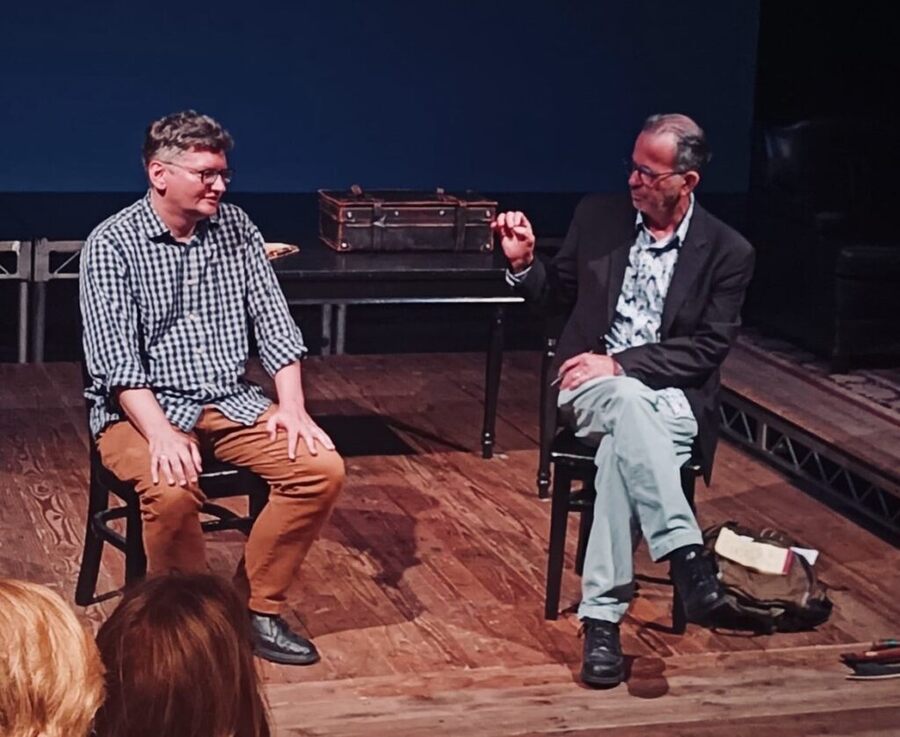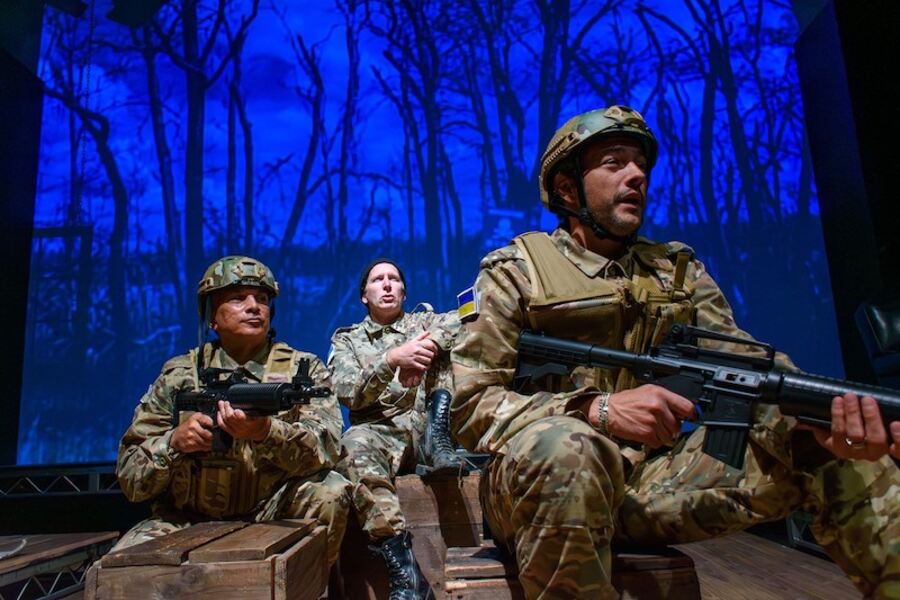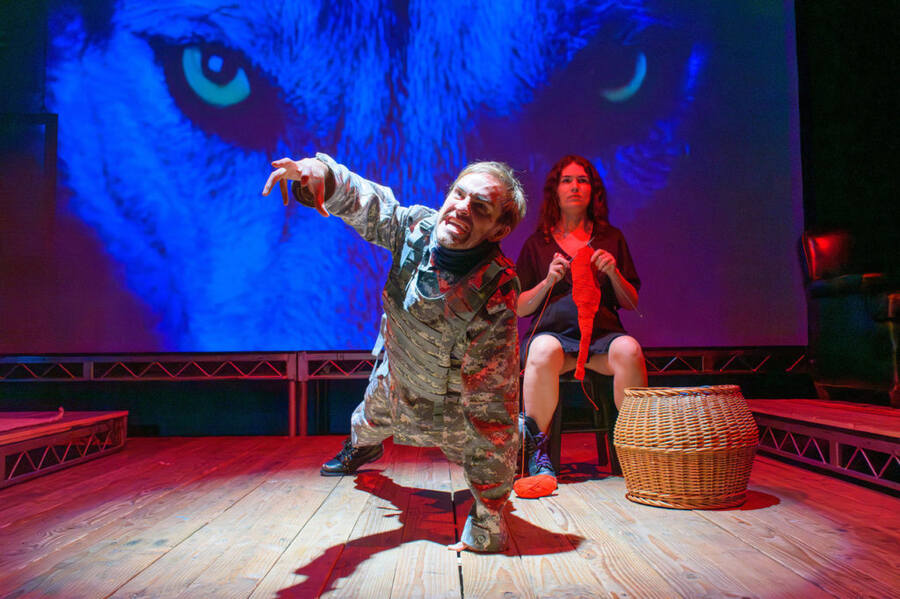This is one of three recent AT pieces about theatre related to the current war in Ukraine. The other two are here and here.
“Russians can’t be trusted,” Ukrainian playwright Andriy Bondarenko told me. “None of them.”
That seems a bit severe, as a generalization, coming from a scholar and a cultural historian, but Bondarenko doesn’t back down. Bondarenko lives in Lviv, which has not been hit as hard by Russian strikes as cities such as Odessa, Kyiv, and Kherson. Indeed, the response to bombardments in Lviv is comparatively cavalier, Bondarenko reported, with many locals ignoring the authorities’ shelter-in-place orders or simply hunkering down in corridors when missiles or drone parts crash nearby. “Life goes on,” he explained. “In cities that have been hit harder, there’s a different, more serious attitude.”
We were sitting by ourselves at a table on the stage of City Garage’s now empty theatre in Santa Monica, Calif., following a performance of Bondarenko’s three short plays about the current War in Ukraine under the collective title, Ghost Land. The triptych, commissioned by City Garage, were translated into English by John Freedman with Vladyslav Hetmanenko. (Freedman, an American and fluent Russian speaker, lived in Russia for decades with Oksana Mysina, his wife, a Ukrainian-born Russian actress and anti-war activist. Freedman was also the longtime theatre critic for the Dutch-owned newspaper, The Moscow Times, but the couple left Moscow for Greece after Freedman and Mysina grew increasingly weary and annoyed that their every move and every word were being monitored by Vladimir Putin’s government. The officials made it no secret that they were spying on the couple—they actually relished the dynamic, Freedman once told me. From Greece, Freedman was instrumental in coordinating the Worldwide Readings Project, helping to translate hundreds of new Ukrainian plays and giving them international exposure through public readings.)

Bondarenko’s belief that Russians lack any kind of principles beyond their personal self-interest extends to intellectuals and theatre artists as well. He noted the case of Moscow’s flagship government-funded Sovremennik Theatre, whose artistic director Viktor Rhyzakov was summarily replaced after signing a letter opposing the war in Ukraine (co-signed by Alexei Agranovich, leader of the Gogol Center, who also lost his job over the letter).
But Bondarenko has trained his focus on the stream of artists who, faced with such conditions, say, “Let’s take the government money and put on plays, on the condition that they stay away from politics”—a syndrome of amoral self-preservation that evokes István Szabó 1981 film Mephisto, which follows an actor in 1930 who appeases the German Nazis to continue playing in front of footlights.
There have been sporadic protests by Russians against the war, I pointed out. Is Bondarenko really ready to throw the baby out with the bathwater? As an artist, I asked him, do you feel no compassion for Russians who have lost careers and/or been driven out of their country for speaking out?
“They are not being bombed,” Bondarenko countered. “I don’t feel compassion for them. I feel compassion for my friends who are being killed, and my fellow countrymen who live in terrible conditions because of their war. For what would I feel compassion for Russians? I don’t see anti-war Russians in Europe. Their life now is not so good as it was, but not as bad as ours, in the way it’s changed. I just feel for pity for them. They had such a great culture. They had such a great position in the world. Their writers had such respect. And with all of this, with all they’ve done, their great culture didn’t help them.”
The plays in Bondarenko’s Ghost Land blend metaphysics and despondency, grappling with political trauma in the way Sarah Kane’s plays grappled with personal trauma. Not that they serve up lectures; rather, they offer a schrei of despair for the victims of a kind of home invasion on a national scale. These psychic wounds will not go away quickly.
The short play “The Butterfly” studies a cultural historian and Ukrainian soldier (David E. Frank) as he speaks with a psychiatrist (a Freudian Andy Kallok) whose face is beamed via video onto an upstage screen. The discussions entail the reenactment of battle scenes and the fever-dream ambiguity of whether the soldier is continuing to hallucinate them or whether they’re real, as well as whether he is now dead or alive, or perhaps emerging from some cocoon. (Bondarenko is a cultural historian but this play is not autobiographical, he said; it was inspired by a colleague who was killed during a Russian missile attack.)

“The Dowry” concerns an aging husband and wife (Kallok and Juliet Morisson) in Ukraine suffering the indignity of two soldiers from the Russian army barging in to seize their pregnant daughter (Léa De Carmo) and pillaging everything they possess, including the clothes on their backs. That these “Russian” invaders are actually local Ukrainian villagers, finding work where they can, addresses one complexity of life in a hellscape, tempered somewhat by the arrival of a sympathetic Ukrainian soldier in the aftermath of the assault. The hellscape becomes more pronounced in “Crime and Punishment,” a study in defiance by a Ukrainian woman (Angela Beyer, stoic in her resolve) and the jocularly sadistic medic (Gifford Irvine) assigned by the Russians to torture her.
I noticed that “The Butterfly” includes a reference to ancient Greek mythology and the role the Black Sea played in it. I pointed out to Bondarenko that ancient Greek tragedies were not pedantic, though they too picked up where reason left off. They tried to imagine that all of the characters had valid points of view, and their audiences, like juries, were invited to weigh the evidence of each opponent’s argument.
“As an artist,” I asked him, “do you not believe that a purpose of theatre is to create empathy for people you disagree with?”
“I’ve been wrestling with that question,” he replied. “I used to believe that. I once thought we should not completely throw out the Soviet socialist experience. Because I saw that we are living in a world where we could think about something good, and take good lessons from the past, and continue to try to speak to each other.
“With this war,” he continued, “when it started in 2014 (in Crimea), it changed me…With the Russians, we’re not talking about people we disagree with, we’re talking about people who want to kill us. If you’re looking for only good things, you will be killed. We live in a dangerous world where evil is real.
“We must adapt to this reality. We must do good in this world, but we must be more wise than we were. We must be realistic. How can we create a better world where Russia exists? First we must conquer the evil on the battlefield, and after that we can start thinking about the other things.”
Steven Leigh Morris (he/him) is a veteran journalist, playwright, novelist, and founding editor of the L.A.-based theatre discussion website Stage Raw.


